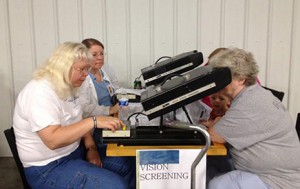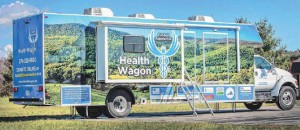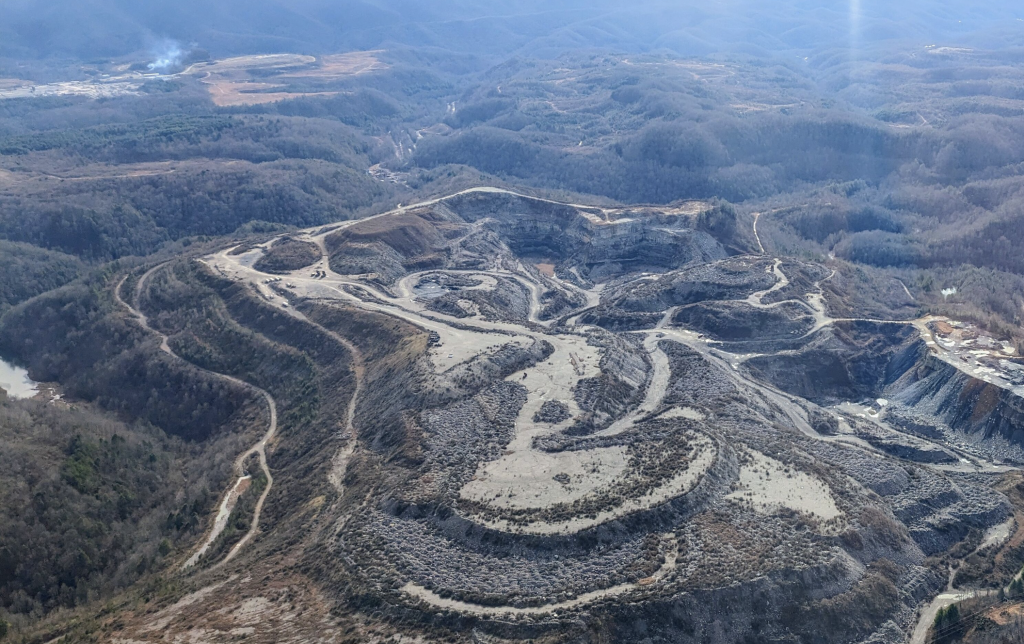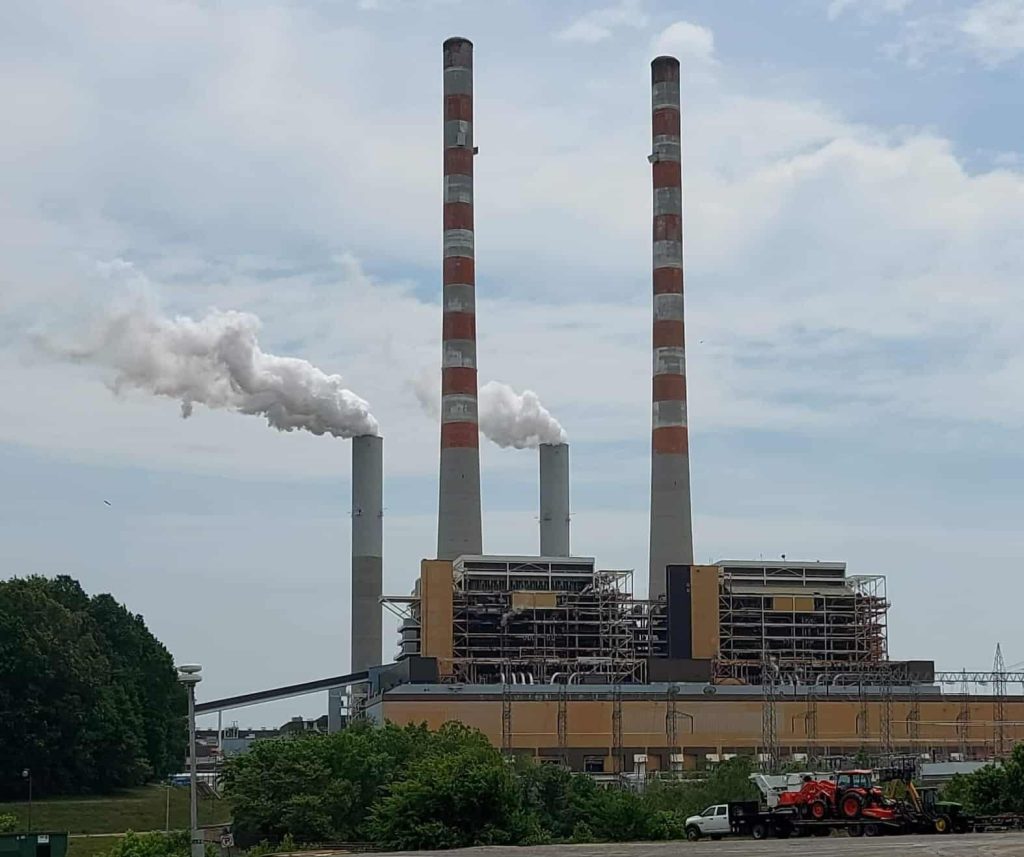Appalachia’s Health Checkup
Region faces escalating medical need, responds with community-based initiatives
By Molly Moore
Some days people meet The Health Wagon at the Lee County airport in southwest Virginia. Other days, it’s the community center in Dickenson County, or a local church. No matter where the mobile clinic vehicle pulls up, local residents step into a small waiting area, where they are greeted by a local volunteer before heading to one of the clinic’s two exam rooms to meet with a nurse-practitioner for a donation-based or free medical appointment.
Nearly 25 years after Sister Bernie Kenny first traveled the mountain roads in a Volkswagen Beetle bringing healthcare to those in need, her ministry has grown into a full-fledged southwest Virginia nonprofit organization with two stationary facilities and two mobile units.

Volunteers facilitate a vision test at a health fair in Wise, Va., organized by The Health Wagon. Nearly all patients at the free healthcare clinics hosted by the aid organization Remote Area Medical are in need of dental and vision care, says founder Stan Brock. Photo courtesy The Health Wagon
Today The Health Wagon is run by Dr. Teresa Gardner, a family nurse practitioner. She began working alongside Sister Kenny in 1993 and speaks about the region’s health needs with genuine passion and determination.
“I have never seen the need more dire in my 22 years that I have been here,” Gardner says. “The need is phenomenal. We have patients on a waiting list.”
In 2013, The Health Wagon saw 4,167 separate patients and provided $2.2. million in free medical care. The patients visiting The Health Wagon are likely at risk for the same ailments that saddle the region as a whole. Appalachians are disproportionately affected by cardiovascular disease, diabetes, obesity and specific cancers such as lung, colorectal and cervical, according to “Appalachian Health and Well-being,” published in 2012. Kidney disease, mental and oral health, traumatic injuries and substance abuse are also regional concerns.
Dr. Joseph Smiddy, medical director at both the Health Wagon in southwest Virginia as well as Body and Soul Ministries in Belize, says more people in the region are falling out of the healthcare system now than when he began charity work 15 years ago. In his experience, cancers are now being diagnosed later in life than they were several years ago, and dental work is now more expensive relative to the economy. People are not receiving mental health or preventative care, he says, and epidemics of lung disease, diabetes and obesity are worsening.
Learn More
The Robert Wood Johnson Foundation publishes annual county-level information about health outcomes and factors that influence health. Explore data about your area at countyhealthrankings.org.
The gap in healthcare coverage is evident at free clinic events that nonprofit organization Remote Area Medical hosts across the country, as hundreds of people wait in line overnight to receive medical care the following day.
Remote Area Medical, based in Rockford, Tenn., formed in 1985 to deliver airborne medical care in developing nations, but began operating in the United States in the early ‘90s. The organization has since hosted 742 events in 11 states. The nation’s largest annual event is held in partnership with The Health Wagon in Wise County, Va. At the RAM clinics, volunteers set up scores of dental chairs and examination facilities, and doctors arrive to donate their services. Some bring their own equipment too; Smiddy arrives with a 70-foot tractor-trailer rigged with two digital X-ray machines.
Most patients who make the early-morning journey to the temporary health clinics are motivated by a pressing need to see the dentist or eye doctor, but while waiting in line they are encouraged to also visit other medical specialists at the event. Through these visits, RAM providers have identified thousands of cases of previously undiagnosed diabetes, hypertension and cancer.
Similarly, every visitor to The Health Wagon is screened for diabetes, chronic obstructive pulmonary disease and coronary artery disease. The organization also hosts regularly scheduled sessions to address specific issues, such as respiratory disease, wound care and endocrinology — sometimes in collaboration with specialists from the University of Virginia, who provide care remotely via sophisticated, secure video technology.

A new mobile health unit recently replaced an aging vehicle that had become unsafe to drive. Mobile units allow The Health Wagon to reach patients in remote areas, and also provide low-cost facilities that help keep overhead costs low. Photo courtesy The Health Wagon
Gardner is frank about the Health Wagon’s financial limitations. The economic struggles in southwestern Virginia mean there is extraordinarily high demand for the organization’s services at a time when resources are especially tight. The nonprofit’s capacity is also taxed by the addition of new services such as monthly screenings in Wise to help diagnose cervical cancer and other women’s health issues. Despite this, she says, “We have to do something for these patients because there are patients that are dying here without care.”
Steps Toward Transformation
Margaret Tomann, program manager at the Healthy Appalachia Institute — a collaborative effort at University of Virginia’s College at Wise — acknowledges the need in the region but believes it’s just as important to recognize local examples of success. Indeed, the Healthy Appalachia Institute’s stated goal is “to transform Central Appalachia into a leading model for rural community health throughout the world.”
That transformation can take place on a local level, says Dr. Sue Cantrell, director and acting director of Virginia’s LENOWISCO and Cumberland Plateau Health Districts. Social and environmental factors such as neighborhood crime and the ability to commute on safe roads are inextricably linked to health outcomes, she notes. For example, obesity leads to a host of health problems, but more kids will walk to school if sidewalks are available and the community is safe.
By examining barriers to positive health choices, these circumstances can be addressed, piece by piece. To encourage morning and early-evening walkers, a greenway trail system in Big Stone Gap now sports solar-powered lights, and Pennington Gap in Lee County, Va., recently received funding to install exercise stations along their walking trails. In addition to countering obesity and heart disease, establishing an active routine can also help people break the cycle of substance abuse.
This holistic approach is being employed across the region. In eight western North Carolina counties, an initiative called MountainWise is surveying the health impacts of a vast suite of community policies — such as transportation and park plans — in an effort to integrate health goals into county and town development.
The ambitious undertaking is the first of its kind in the United States, according to MountainWise, a project of the North Carolina Community Transformation Grant Project and the Centers for Disease Control and Prevention. The results of the assessments will be used to facilitate access to healthy food, provide opportunities for physical activity and support tobacco-free areas.
Improvements in physical activity and nutrition are most achievable when there is a solid foundation of education and economic security, says Cantrell. Someone juggling multiple jobs is less likely to have the time and energy for physical activity, she says, and people who succeed in school are more likely to have health insurance — and are better positioned to navigate the healthcare system.
At the Healthy Appalachia Institute, Tomman adopts a like-minded view. After noticing similar patterns of poor health indicators in counties in East Tennessee and southwest Virginia, the Healthy Appalachia Institute hosted an event to build cross-state, regional awareness of the issue. Attendees included leaders in health, economic development and education, fields that Tomman says “are so closely intertwined you can’t really do one without the other.”
In one Virginia initiative, more than 20 regional collaborators are creating an outdoor recreation plan called “Health is Right Outside” that combines health and economic goals. The beauty of the Appalachian Mountains offers tourism and economic development opportunities, and Cantrell hopes that efforts to market area trails and rivers to visitors will also entice locals to nearby outdoor activities. “There’s a lot here that the average person living in this area can benefit from and enjoy,” she says.
Cantrell reflects that some actions to improve health must be taken on an individual level, but other changes, such as improving the high school graduation rate or building a trail network, can be accomplished together. “We can do it as a community and impact more people, and potentially their children and grandchildren.”
Mountain Cultures of Health
Two Appalachian communities were among the six nationwide recipients of the Robert Wood Johnson Foundation Culture of Health prize for 2014.
Buncombe County, N.C., home to Asheville and surrounding rural areas, received the award for addressing childhood poverty as a root cause of poor health and establishing a Public Health Advisory Council. The county’s noteworthy projects include reducing exposure to secondhand smoke by making multi-unit housing smoke-free, and creating handbooks to help families of children with special needs track medical information.
Williamson, W.Va., a town with exceptionally high rates of obesity, hypertension and diabetes in a state that is already plagued with poor health, also earned the prize for launching health and wellness programs aimed at reversing the area’s health status. Community initiatives include support for health-oriented entrepreneurship, a booming community garden, monthly 5k races, and a free clinic — built with an energy-efficient design — that serves Pike and Mingo counties and includes a comprehensive diabetes outreach program.
Related Articles
Latest News

Leave a comment
Your email address will not be published. Required fields are marked *
One response to “Appalachia’s Health Checkup”
-
And yet the Republicans in the General Assembly still refuse to expand Medicaid. What an incredible shame.





Leave a Comment